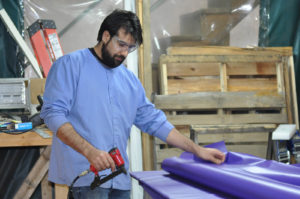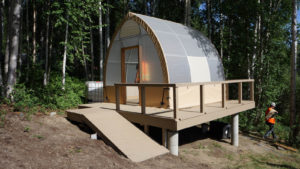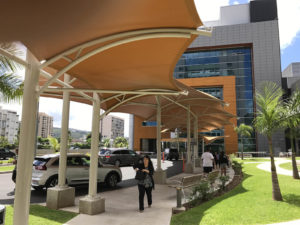
Roller coasters belong in amusement parks, not on a company’s balance sheet. Yet for many specialty fabricator businesses susceptible to seasonal ups and downs, it may sometimes seem as if the operation is being taken for exactly that kind of ride.
Not every business is prone to periodic slowdowns in work. But for those that are, thanks perhaps to a combination of products offered and location, maintaining a steady income flow can be problematic, requiring some creative thinking.
Although he is based in a sunny environment, Gary C. Barnes, co-owner with wife Jeri of Tropical J’s Inc. in Honolulu, Hawaii, still has to contend with slack periods. However, the small size of the Hawaiian market has forced Tropical J’s to diversify, so things don’t slow down much.
The company designs, manufactures and installs commercial shade products like wood-framed commercial umbrellas, awnings, canopies, four-posted cabanas, beach/chaise cabanas, small tensile structures up to 100 feet and large commercial shade sails. Markets include hotels, condominiums, shopping centers and high-end residential, along with military, federal, state, county and city end users. Tropical J’s also sells other outdoor shade product items that wouldn’t make sense for it to develop and manufacture on its own.
The company, opened in 1989, relies on an outside commissioned salesperson, utilizing its management staff to assist in sales when there’s a job dip. When the work increases, that staff returns to filling orders.
“More than focusing on strategies to increase our sales, we’ve focused on production processes and methodologies to improve our quality, reduce production time and better serve our customers,” says Barnes.
The company has invested heavily in technology, recently purchasing an Eastman® Eagle™ CNC fabric cutter, a large roller-bender, production welding equipment and wire swaging equipment, among others. Tropical J’s also built a custom-designed factory—which it outgrew within three years, Barnes says.
Managing cash flow
With roots going back to the 1940s, Columbus, Ohio-based Capital City Awning designs, manufactures, installs and services residential and commercial awnings throughout central Ohio; the company also provides awnings nationwide for several retail and restaurant clients, says Timothy Kellogg, president and general manager. It’s not unusual for the awning business to experience slow periods during the winter.
“Our residential clients, for the most part, have little interest in our shade and patio products during this time,” Kellogg says. “And most of our national retail clients build new stores to open in the fall. They don’t open stores in January through March, so there’s much less retail work for us then.”
Kellogg says Capital City Awning copes by managing its cash flow, preserving it during the busy months, which allows the company to meet its fixed costs during leaner times. He hunts for opportunities all year long and adjusts pricing to offer incentives to customers to purchase during the winter rather than waiting until spring.
“We also store awnings for about 1,200 residential customers in the fall, and we provide repairs, cleaning and replacement during the winter months,” Kellogg says. “We encourage projects that will provide work during the winter.”
Capital City Awning has a sister company, Columbus Canvas Products—soon to change its name to CCP Manufacturing—that sews a wide variety of fabric items for multiple clients, including military, health care and athletic products companies.
“It is not prone to seasonality,” says Kellogg. “At times, CCP will experience a light period between projects, but that’s more random in nature rather than cyclical.”

Slow-season strategizing
Fairbanks-based Custom Canvas Alaska LLC has found ways to stretch into new markets and keep the business thriving all year long. When the company first opened in 2005, it focused mainly on providing marine fabric for the river-type boats that were the primary kind of vessel used in that area, says Devlin McKee, co-partner with Eric Walton. In fact, marine jobs comprised about one-third of the business, with the other two-thirds consisting of awnings (which they build from the ground up) and insulated covers for heavy equipment.
Mindful of the short boating season and a relatively small customer base, the pair knew they’d have to add to their professional repertoire. Now, along with their initial offerings, they also make portable shelters, custom bags, RV bras and skirts, side-by-side enclosures for ATVs, outdoor RV seats and covers, and replacement panels for fabric structures. Their service area spread to the North Slope and south down to Valdez. Business from the North Slope comes to them, says McKee, while once a month during the summer, he travels to Valdez, 350 miles away, spending the weekend there working on large boats.
“At this point, we’re about one-quarter marine, one-quarter portable shelters, one-quarter insulated covers and one-quarter other,” says McKee, adding that the company’s objective was to stay profitable and open year-round. Custom Canvas has been able to achieve that goal, keeping its five employees.

Forging partnerships can also help mitigate seasonal droughts. For example, Custom Canvas Alaska partnered with a company to make replacement panels for fabric structures. But to do so, the company needed a larger facility. Now, it’s working out of a 6,000-square-foot structure—its previous workspace was about a third this size—that is half tensioned fabric and half insulated panels, provided by that partner and rented by the company.
The arrangement has also allowed Custom Canvas Alaska to expand its season. Prior to moving into the structure about 10 years ago, much of the work took place outside. Now the team is able to pull the boats and other vehicles indoors, greatly speeding up the projects and getting the boats back on the water faster.
Tropical J’s has also established a number of partnerships that have helped the company avoid excessive slowdowns, including relationships with suppliers, developers, contractors and architects. According to Barnes, partnering with architects has proven its most lucrative source of work.
Pamela Mills-Senn is a freelance writer based in Long Beach, Calif.
 TEXTILES.ORG
TEXTILES.ORG


